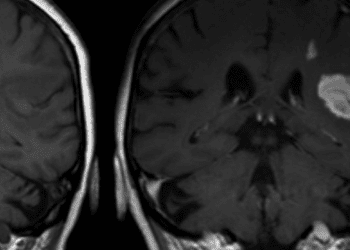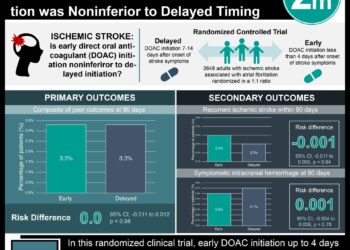Bleeding risk mildly increased amongst the very elderly taking Vitamin K antagonists
1. Based on a matched control study of elderly patients for whom anticoagulation was indicated, bleeding risk was mildly higher in patients 90 or older and the same amongst patients 80-89 years old as compared with those between ages 70-79 years old.
2. The risk of thrombosis was significantly higher for patients in their 80s and 90s, arguing for continued use of anticoagulation even amongst the very elderly under the correct circumstances.
Evidence Rating Level: 2 (Good)
Study Rundown: The risks and benefits of anticoagulation amongst the very elderly are difficult to determine. Many of the studies that show benefit of anticoagulation in appropriate scenarios often did not include the age cohort of 90+ year olds. With increasing life expectancy, this question is important to answer. This matched cohort study conducted in the Netherlands aimed to determine the risk of bleeding and thrombosis in the very elderly who were treated with a vitamin K antagonist (VKA).
Based on the results of the study, there was a mild increase in bleeding events in patients 90 or older and no significant increased risk of bleeding in patients aged 80 to 89, as compared with patients 70 to 79 years old. The point estimates for major bleeding (including fatal bleeds) were similar across all three patient age groups. Risk of thrombosis was higher for patients in their 80s and 90s than patients in their 70s. However control with VKA was significantly poorer with increasing age, especially in patients 90 years or older. This partially accounted for the increased risk of bleeding in the very elderly, but the risk was mostly not mediated by VKA control. The strength of the study was the broad inclusion criteria of patients on VKA, length of follow-up, and the size of the cohort. Limitations of this study included the clear exclusion of patients already deemed too high risk for anticoagulation by their physicians, which the study could not capture.
Click to read the study in JAMA Internal Medicine
In-Depth [retrospective cohort study]: This matched retrospective cohort study took place between January 2009 to June 2012 and included patients from one thrombosis center in The Netherlands. The cohort consisted of patients older than 70 years on VKA. Patients were matched based on age: 90+ year olds matched to 80-89 year olds and to 70-79 year olds. Data was collected from their computerized records for all bleeding, thrombosis, medication discontinuation events or deaths. The cause of death was gathered. Measurements of the INR were also recorded to ensure they were within therapeutic range. The primary outcome was a composite of clinically relevant non-major and major bleeds. Secondary end points were major bleeding, death related to bleeding or thrombosis, thrombotic events, permanent treatment discontinuation owing to bleeding problems and quality of VKA control. Cox proportional hazards regression was used to analyze the age cohorts against the 70-79 year old cohort.
Over 26,000 patients were treated at the Certe Thrombosis Service Groningen during the study period. In total the cohort had 3,313 patients: 90 years or older (n = 1109), 80-89 (n = 1100) and 70-79 (n = 1104). Of these, 713 patients had 1050 bleeding events. The event rate (ER) of bleeding in patients aged 90 or older was significantly higher than the comparison group (ER 18.1; HR 1.26; 95%CI 1.05-1.50) whereas there was a non-significant difference in bleeding rate in patients 80-89 (ER 16.7; HR 1.07; 95%CI 0.89-1.27). The risk of bleeds was greater in men than women. Eighty-five patients (2.6%) developed a thrombotic event. Risk of thrombosis was higher in patients 90 and older (HR 2.14, 95%CI 1.22-3.75) and also patients 80-89 (HR 1.75, 95%CI 1.002-3.05). Vitamin K antagonist control became significantly poorer with increasing age.
Image: CC/Wiki
©2016 2 Minute Medicine, Inc. All rights reserved. No works may be reproduced without expressed written consent from 2 Minute Medicine, Inc. Inquire about licensing here. No article should be construed as medical advice and is not intended as such by the authors or by 2 Minute Medicine, Inc.






![Adverse pregnancy outcomes associated with thrombophilias [Classics Series]](https://www.2minutemedicine.com/wp-content/uploads/2015/07/Classics-2-Minute-Medicine-e1436017941513-75x75.png)
